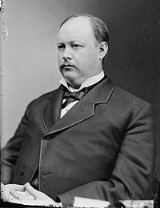
1789 In New York City, the United States House of Representatives holds its first ''quorum'' and elects Frederick Muhlenberg of Pennsylvania as its first House Speaker.
1789 James Madison introduces twelve proposed amendments to the United States Constitution in the House of Representatives; by 1791, ten of them are ratified by the state legislatures and become the Bill of Rights; another is eventually ratified in 1992 to become the 27th Amendment.
1801 An electoral tie between Thomas Jefferson and Aaron Burr is resolved when Jefferson is elected President of the United States and Burr Vice President by the United States House of Representatives.
1824 U.S. presidential election, 1824: Since no candidate had received a majority of the total electoral college votes in the election, the United States House of Representatives is given the task of deciding the winner in accordance with the Twelfth Amendment to the United States Constitution.
1825 After no presidential candidate receives a majority of electoral votes in the election of 1824, the United States House of Representatives elects John Quincy Adams President of the United States.
1831 Former US President John Quincy Adams takes his seat in the House of Representatives.
1846 The United States House of Representatives votes to stop sharing the Oregon Territory with the United Kingdom.
1856 Congressman Preston Brooks of South Carolina beats Senator Charles Sumner with a cane in the hall of the United States Senate for a speech Sumner had made attacking Southerners who sympathized with the pro-slavery violence in Kansas ("Bleeding Kansas").
1861 American Civil War: United States House of Representatives unanimously passes a resolution guaranteeing noninterference with slavery in any state.
1868 Andrew Johnson becomes the first President of the United States to be impeached by the United States House of Representatives. He is later acquitted in the Senate.
1901 US President Theodore Roosevelt delivers a 20,000-word speech to the House of Representatives asking the Congress to curb the power of trusts "within reasonable limits".
1911 Public Law 62-5 sets the number of representatives in the United States House of Representatives at 435. The law would come into effect in 1913.
1915 The United States House of Representatives rejects a proposal to give women the right to vote.
1917 Jeannette Rankin of Montana becomes the first female member of the United States House of Representatives.
1947 The United States Senate follows the United States House of Representatives in overriding U.S. President Harry Truman's veto of the Taft-Hartley Act.
1948 Margaret Chase Smith is elected senator, and becomes the first woman to serve in both the U.S. House of Representatives and the United States Senate.
1973 The Twenty-fifth Amendment: The United States Senate votes 92 to 3 to confirm Gerald Ford as Vice President of the United States (on December 6, the House confirmed him 387 to 35).
1973 The Twenty-fifth Amendment: The United States House of Representatives votes 387 to 35 to confirm Gerald Ford as Vice President of the United States (on November 27, the Senate confirmed him 92 to 3).
1974 Watergate Scandal: The United States House of Representatives Judiciary Committee opens formal and public impeachment hearings against President Richard Nixon.
1974 Watergate Scandal: the House of Representatives Judiciary Committee votes 27 to 11 to recommend the first article of impeachment (for obstruction of justice) against President Richard Nixon.
1979 The United States House of Representatives begins broadcasting its day-to-day business via the cable television network C-SPAN.
1988 Iran-Contra Affair: The United States House of Representatives rejects President Ronald Reagan's request for $36.25 million to aid Nicaraguan Contras.
1993 In the United States, the North American Free Trade Agreement (NAFTA) is ratified by the House of Representatives.
1997 Newt Gingrich becomes the first leader of the United States House of Representatives to be internally disciplined for ethical misconduct.
1998 Lewinsky scandal: The United States House of Representatives forwards articles I and III of impeachment against President Bill Clinton to the Senate.
1999 The United States House of Representatives releases the ''Cox Report'' which details the People's Republic of China's nuclear espionage against the U.S. over the prior two decades.
2002 Democrat James Traficant is expelled from the United States House of Representatives on a vote of 420 to 1.
2002 The United States House of Representatives votes not to create an independent commission to investigate the September 11 attacks.
2006 US Representative Mark Foley resigns after allegations of inappropriate emails.

